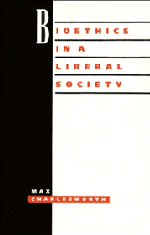2 - AUTONOMY AND THE LIBERAL IDEAL
Published online by Cambridge University Press: 03 May 2011
Summary
The idea of autonomy
The idea of autonomy is a blindingly obvious one. It simply means that if I am to act in an ethical or moral way I must choose for myself what I am going to do. I may of course take advice from others and I may be subject to persuasion and pressure from external sources, but when the chips are down I must decide and choose for myself. Only then is what I have done imputable to me so that it is my act, and only then am I responsible for it and praiseworthy or blameworthy for it. As a contemporary thinker has put it:
While we may be mistaken in our beliefs about value, it doesn't follow that someone else, who has reason to believe a mistake has been made, can come along and improve my life by leading it for me, in accordance with the correct account of value. On the contrary, no life goes better by being led from the outside according to values the person doesn't endorse. My life only goes better if I'm leading it from the inside, according to my beliefs about value. Praying to God may be a valuable activity, but you have to believe that it's a worthwhile thing to do — that it has some worthwhile point and purpose. You can coerce someone into going to church and making the right physical movements, but you won't make someone's life better that way. […]
- Type
- Chapter
- Information
- Bioethics in a Liberal Society , pp. 10 - 29Publisher: Cambridge University PressPrint publication year: 1993

